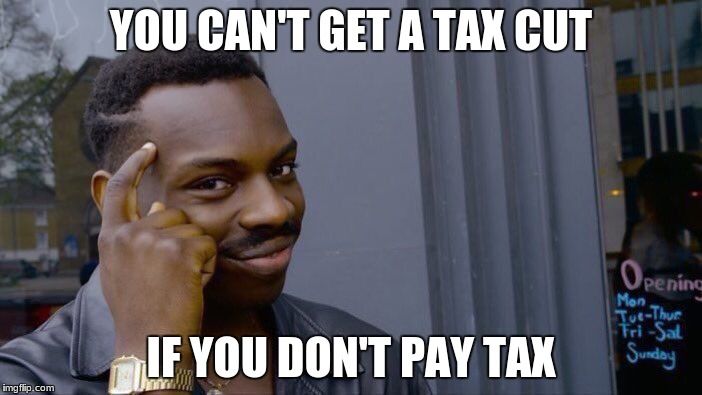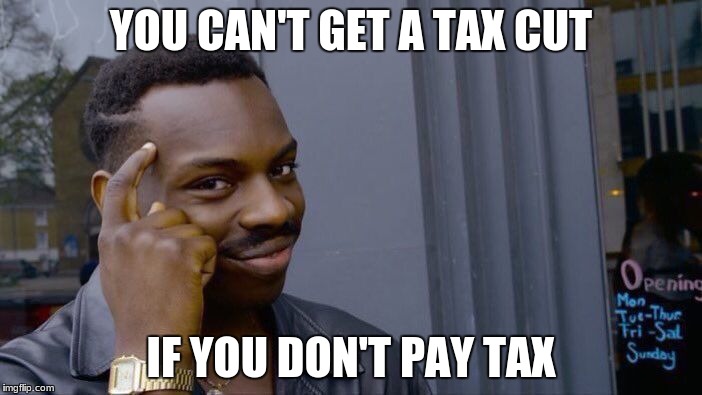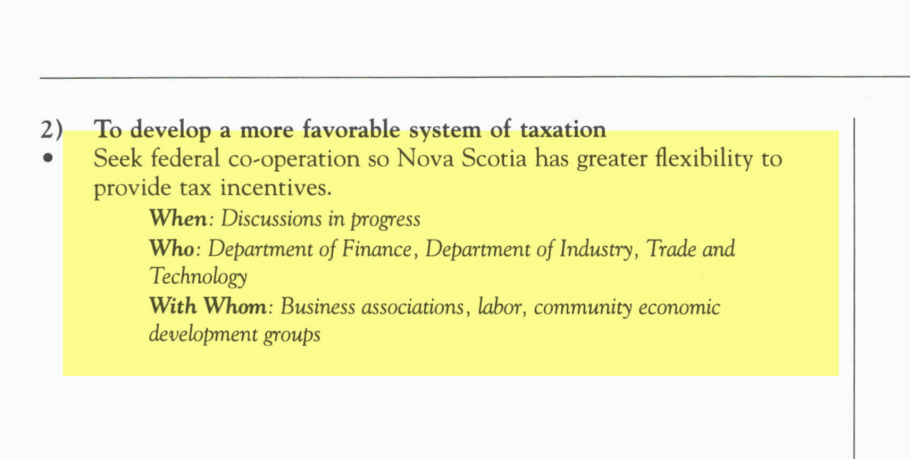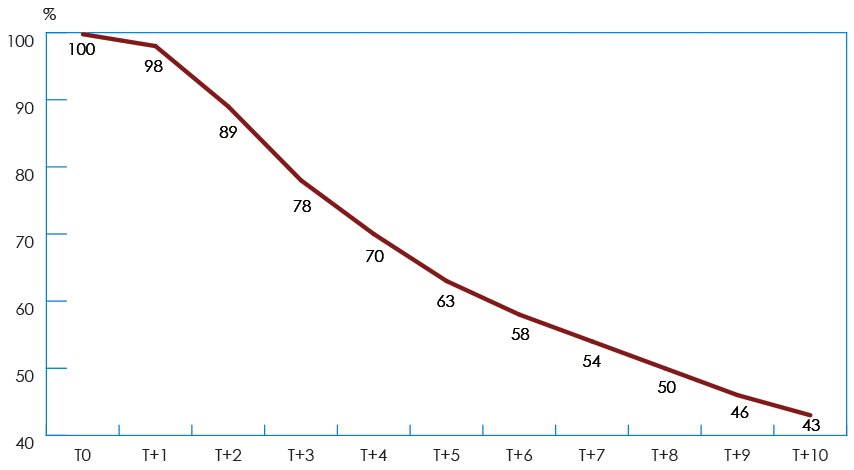You Don't Go Broke Paying More Income Tax

Taxes, taxes, taxes.
We have to cut taxes to incentivize people to start businesses.
Just one more tax cut will fix our entrepreneurship problem.
This is one of those ideas that we’ve kept recycling for the last 30+ years.
It was a bad idea 30 years ago, and it’s still a bad idea today. It doesn’t work.((Not only is it a bad idea. It’s a completely disingenuous argument. It’s an argument being made by the 1%. They are hiding behind entrepreneurs, in order to cut their own taxes and keep more of their own money. I’ll investigate this more in future newsletters.))

In my first newsletter I talked about how we’ve been using the same economic development strategies for 30+ years, and they haven’t worked.
After writing that newsletter I studied the Nova Scotia Government’s 1991 Economic Development Strategy; cutting taxes to spur entrepreneurship was a key focus in 1991.
Quote #1((‘Creating Our Own Future – A Nova Scotia Economic Strategy’, p. 42))


By now we have to accept that “changing the tax system” means lowering corporate income tax rates.
Action Item #1((‘Creating Our Own Future – A Nova Scotia Economic Strategy’, p. 44))

Action Item #2((‘Creating Our Own Future – A Nova Scotia Economic Strategy’, p. 45))

Basically, the solution here was to cut taxes or provide tax incentives to spur entrepreneurship.
How does this relate to entrepreneurship and new businesses?
My grandfather was born in the 1920s and always said, “You don’t go broke paying more income tax.” His point was you only pay income tax when you’re making money. Even if you pay a 55% marginal tax rate, you’re still keeping 45% of that extra dollar.((And by the time you hit the highest marginal tax rate, you’ve made a significant amount of money.))
He was talking about personal income taxes, but the logic still applies to businesses.
Businesses only pay corporate income tax when they are making money, and brand new business just aren’t making money.
Survival Rates of Businesses, 2002-2014
ISEDC investigated birth and survival rates of business in Canada from 2002-2014 and produced the following chart:((Canada New Firms: Birth and Suvival Rates Over the Period 2002-2014 , Figure 3, p. 7))

After 3 years, about 1 out of 4 businesses weren’t making money and failed
After 5 years, about 1 out of 3 businesses weren’t making money and failed
After 10 year, about 1 out of 2 businesses weren’t making money and failed((It’s not just they’re not making money. The business is probably losing money, and if the business is losing money the owner also isn’t getting paid.))
This means the probability of making money and then paying corporate income tax for a new business is extremely low. Unless something changed recently, 50% of 0 is 0, 25% of 0 is 0, and 0% of 0 is still 0.
The problem is the 0, not the tax rate.
Here comes the twist…
In my first draft of this article, I expanded more on why cutting taxes to spur new businesses doesn’t work.
I wrote about how hard it is to actually start a business and consistently make money. For me that money doesn’t provide enough motivation to push through the hardest days. I had more and it was great content.
Then I realized that’s the game that’s been played for the last 30+ years. The responsibility has been put on us to prove that these ideas are not working, instead of requiring proof the ideas are actually working for the people promoting the ideas.
How does this game work?
Typically we write new reports, we find new data, or we declare something a human right.((We do these need these reports to help us determine the best new ideas to move us forward or build upon. I’m not going to focus on proving old and bad ideas wrong anymore.))
Each time we hope this is the report, idea, or analogy that will make the 0.1%((Or oil companies on climate change, or the real estate industry on affordable housing, or police reform. Basically any entrenched power that is resisting change.)) go, “Oh, now we see the problem. Turns out you’ve been correct this whole time. Let me give up my wealth, power and status.”
But that’s not how the goal of the game for the 0.1%.
The goal is to keep the argument going. If the argument is never settled, then nothing needs to change.((I was reminded of this by Innuendo Studios’ excellent series called the Alt-Right Playbook.)) This maintains the status quo and keeps allowing the 0.1% to benefit immensely.
Tax cuts to spur entrepreneurship is one of these bad ideas that hasn’t proven to work. If this worked I should see the results in my day-to-day life, and I don’t.
Two things entrepreneurs and new businesses actually need
High quality infrastructure
We need our governments to provide and maintain the infrastructure we all use.
This is the physical roads, the highways, the post office. It’s the sewer, water, and broadband networks. It’s the health and education systems, especially higher education((It’s much harder to start a business if you have $50,000 in student loan debt.)).
Providing high quality infrastructure with equal access for all businesses is the foundation that lets new businesses grow, compete and flourish.
Historically we knew and acted on the importance of high quality infrastructure. In 1937, Nova Scotia passed the Rural Electrification Act, with the goal to provide electricity to parts of the province that weren’t going to be serviced by the private sector. Economic growth and development was one of the main goals of rural electrification.
This just makes sense. Could you imagine opening a business without electricity and then trying to compete with a business that does? Impossible.((This is not the approach we chose for rural broadband access, and it’s not working.))
Fair competition in the economy.
Ensuring fair competition in the economy is the purpose of the Competition Act and the Competition Bureau. The consolidation in the Canadian economy over the last 40 years is strangling innovation, and opportunities for entrepreneurs. ((Again, someone can come prove I’m wrong. Maybe they can prove that consolidation in the Canadian economy is helping small towns, small businesses, and people. If they do, I will change my position.)) Currently the Competition Act, the Competition Bureau, and the Federal Government are failing our entrepreneurs, our small businesses, and our communities. We need to fix this.
Ultimately, we need the Competition Act to be completely overhauled and return its focus to fairness and ensuring opportunity for all, instead of “consumer welfare” and “efficiency”. It’s just, this is a major project and won’t happen overnight.((Follow Vass Bednar and Robin Shaban on Twitter to learn a lot more about the Canadian Competition Policy.))
While we are waiting for this major review, we can and must do the following:
Remove the “Efficiencies Defense” from the Merger section of the Competition Act
Update the Competition Act to assume all mergers are anti-competitive, then put the burden of proof on the companies proposing the merger to prove they are not anti-competitive.((Shout out for an appropriate use of a double negative.))
Provide the Competition Bureau the power to compel information from businesses to investigate consolidation in our economy.
None of this is going to happen if we don’t know we need it and then ask for it.

Member discussion